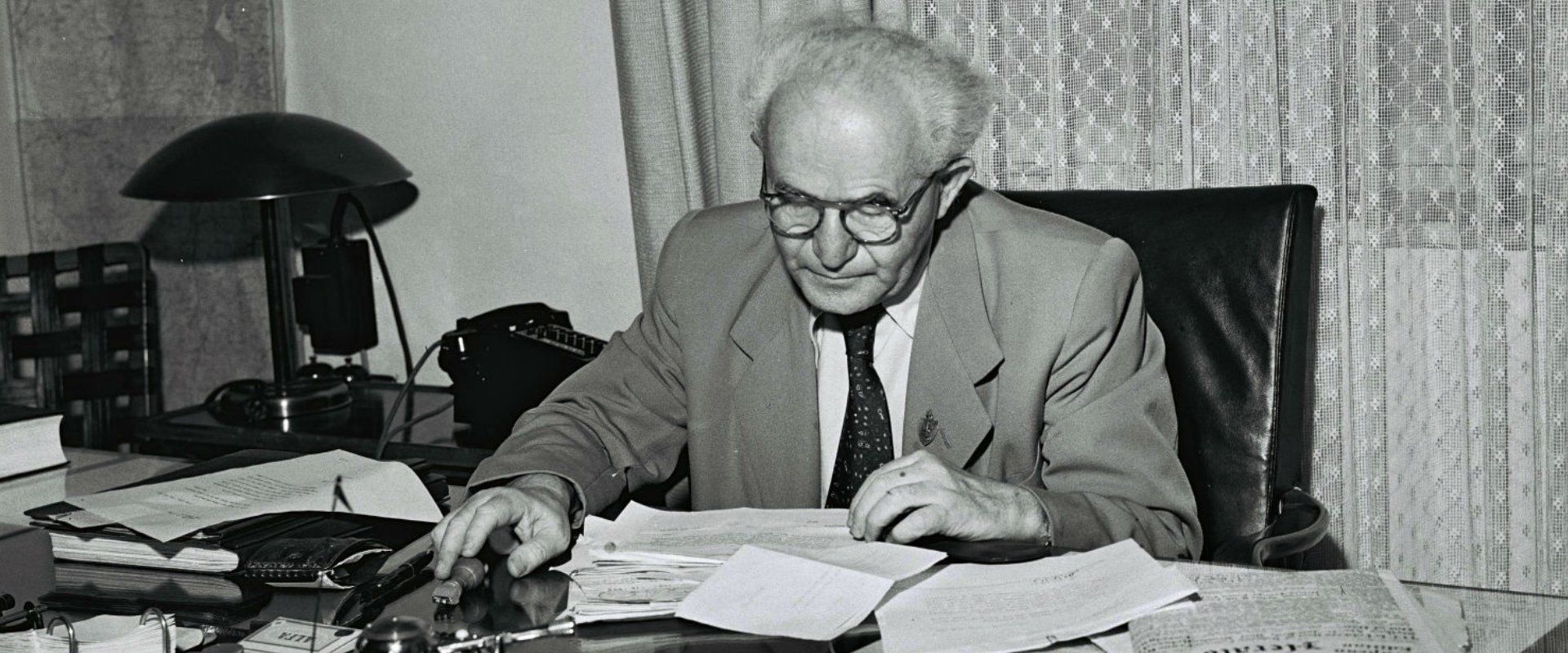
David Ben-Gurion, perhaps the most influential Jewish leader since Moses, needs no introduction. Here though are a few facts about Israel’s first Prime Minister:
It was he who on May 12th, 1948 advocated for what became the name of the State, dismissing the options of Judea, Zion, and Eretz Israel. It was he who pushed – more than anyone else – for the Declaration of Independence, even as Jerusalem and large swaths of the Galilee were cut off, Kibbutz Kfar Etzion had just fallen, and the US, days earlier, had explicitly warned that it would not come to the aid of a young state in the event of a military defeat, which – by the way – seemed entirely possible.
It was he who wrote in his diary on the day of the Declaration, quote, “at four o’clock in the afternoon, Jewish independence was declared and the State was founded. Its fate is in the hands of the armed forces.” It was he who – just five weeks after the founding of the State – gave the order to open fire on the Irgun’s arms ship, the Altalena; a decision that some saw as a test of true leadership and others as a murderous act that would result in civil war. It was he who – though himself a socialist – charted Israel’s course away from the Soviet Union and he who – years later – gave the order to capture Adolf Eichmann and bring him to trial in Jerusalem.
Finally, it was he who – while shepherding the State into existence and shaping more or less all of its institutions from the Mossad to the IDF, from the Histadrut Labor Union to the national Bible Quiz – was forced by his wife Paula to eat the same bland porridge, a blend of applesauce and sour cream that she called “cooch mooch,” every day for breakfast.
The thirty-seven people who signed Megillat Ha’Atzmaut on May 14, 1948, represented many factions of the Jewish population: There were revisionists and Labor Party apparatchiks; capitalists and communists and socialists; kibbutznikim, moshavnikim and city-folk; charedi rabbis and atheists.
Over the course of the past several months, our team has diligently tracked down the closest living relative of each one of these signatories, and interviewed them. We talked about their ancestors and families, about the promise of the Declaration, the places in which we delivered on that promise, the places in which we exceeded our wildest dreams, and also about the places where we fell short.
And it is through these descendants of the men and women who – with the strike of a pen – gave birth to this country of ours, that we wish to learn something about ourselves.
Today we’ll meet David Ben-Gurion, and his eldest grandson, Yariv Ben-Eliezer. He’ll present one of the many political perspectives we’ll be featuring throughout the series.
There is, needless to say, endless material about David Ben-Gurion. Here is a selected list of primary source material and secondary literature that we found particularly helpful while working on the episode:
For a wonderful 2016 documentary film based on a 1968 interview with Ben-Gurion, see Yariv Mozer’s Ben Gurion, Epilogue (pay per view)
Mitch Ginsburg and Lev Cohen are the senior producers of Signed, Sealed, Delivered? This episode was recorded at Nomi Studios and was mixed by Sela Waisblum. Zev Levi scored and sound designed it with music from Blue Dot Sessions. Our music consultants are Tomer Kariv and Yoni Turner, and our dubber is Yoav Yefet.
The end song is Shir Ba’Boker Ba’Boker (lyrics – Amir Gilboa, music – Gideon Koren and Shlomo Artzi, arrangement – Yaron Gershovsky), performed by Shlomo Artzi.
This series is dedicated to the memory of David Harman, who was a true believer in the values of the Declaration of Independence, in Zionism, in democracy and – most of all – in equality.